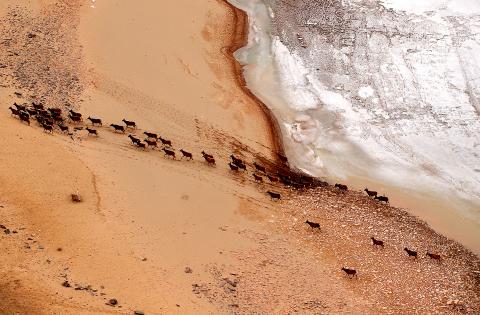A 28-year-old British explorer has become the first person to complete a 6,437km trek along the Yangtze River in China.
Ash Dykes, from Old Colwyn in north Wales, finished the year-long expedition on Monday, overcoming blizzards, a landslide and temperatures as low as -20 degrees Celsius.
Dykes was cheered on by British family and friends as well as Chinese supporters as he crossed the finish line to become the first person to walk the third longest river in the world.

Photo: Reuters
“It feels amazing. It hasn’t kicked in yet,” Dykes said, adding that the trip took two years to plan and one year to execute.
He said the greatest challenge was reaching the source of the river, which at 5,100 meters is almost the same height as Mount Everest base camp.
“There were worries I wouldn’t get to the source,” he said, adding that it was a lot harder than he had anticipated.
Four members of his team left the expedition before it began due to altitude sickness.
Dykes said that early in the journey he was followed for two days by a pack of wolves who had recently killed a woman.
“We could hear them howling and we felt super vulnerable of course. We had to stay vigilant. There were moments when I thought what on earth have I put myself through for the past year,” he said.
MANY FIRSTS
The expedition is Dykes’ third world first. In 2014, he became the first person to walk across Mongolia from west to east in an unsupported solo expedition that took 78 days. He also became the first person to travel the length of inland Madagascar, trekking 1,600 miles over eight mountains in 155 days in 2016.
The explorer said he had long been interested in becoming the first person to complete the trek along the Yangtze.
“It’s one of the biggest things I can find that hasn’t been done yet,” he said.
He said he was drawn to these expeditions because he had “always been fascinated by the world.”
Describing the walking as “a bit boring,” Dykes said: “I love travel, meeting new people and taking on new challenges. This is what I do, it’s in my blood.”
He took note of the amount of plastics and pollution he saw from the source of the river to the sea.
“The good news is that I’ve also seen a huge increase in knowledge and understanding within the communities, towns and cities along the way. People are aware of the damage being caused to their water sources and are now actively changing their ways for the better — it’s inspiring to see,” he said.
RAISING AWARENESS
Dykes worked with the Green Development Foundation, WWF and other environmental organizations to highlight marine plastic, renewable energy and green finance. He was accompanied on the final kilometer by Chris Wood, the British consul-general in Shanghai.
Dykes said he was overwhelmed by the response from Chinese supporters, with millions following him through TV and social media.
“What a wonderful journey it’s been with incredible locals,” he said. “People across the country have been so supportive.”
He said there was still much to discover in China.
“I think I’ll be doing something again in China and try to make it more interactive, not only virtually, but in person too.”

In the next few months tough decisions will need to be made by the Taiwan People’s Party (TPP) and their pan-blue allies in the Chinese Nationalist Party (KMT). It will reveal just how real their alliance is with actual power at stake. Party founder Ko Wen-je (柯文哲) faced these tough questions, which we explored in part one of this series, “Ko Wen-je, the KMT’s prickly ally,” (Aug. 16, page 12). Ko was open to cooperation, but on his terms. He openly fretted about being “swallowed up” by the KMT, and was keenly aware of the experience of the People’s First Party

Aug. 25 to Aug. 31 Although Mr. Lin (林) had been married to his Japanese wife for a decade, their union was never legally recognized — and even their daughter was officially deemed illegitimate. During the first half of Japanese rule in Taiwan, only marriages between Japanese men and Taiwanese women were valid, unless the Taiwanese husband formally joined a Japanese household. In 1920, Lin took his frustrations directly to the Ministry of Home Affairs: “Since Japan took possession of Taiwan, we have obeyed the government’s directives and committed ourselves to breaking old Qing-era customs. Yet ... our marriages remain unrecognized,

During the Metal Ages, prior to the arrival of the Dutch and Chinese, a great shift took place in indigenous material culture. Glass and agate beads, introduced after 400BC, completely replaced Taiwanese nephrite (jade) as the ornamental materials of choice, anthropologist Liu Jiun-Yu (劉俊昱) of the University of Washington wrote in a 2023 article. He added of the island’s modern indigenous peoples: “They are the descendants of prehistoric Formosans but have no nephrite-using cultures.” Moderns squint at that dynamic era of trade and cultural change through the mutually supporting lenses of later settler-colonialism and imperial power, which treated the indigenous as

Standing on top of a small mountain, Kim Seung-ho gazes out over an expanse of paddy fields glowing in their autumn gold, the ripening grains swaying gently in the wind. In the distance, North Korea stretches beyond the horizon. “It’s so peaceful,” says the director of the DMZ Ecology Research Institute. “Over there, it used to be an artillery range, but since they stopped firing, the nature has become so beautiful.” The land before him is the demilitarized zone, or DMZ, a strip of land that runs across the Korean peninsula, dividing North and South Korea roughly along the 38th parallel north. This